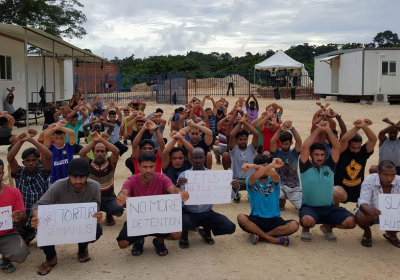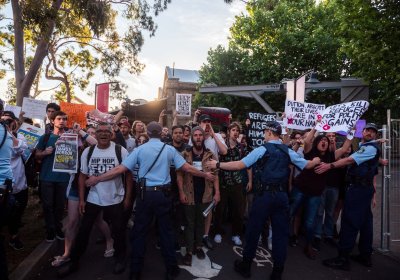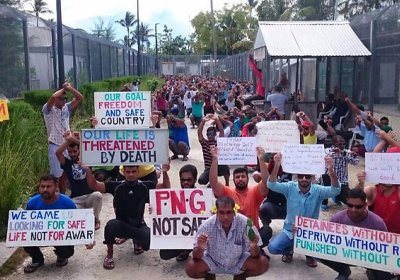Seven protesters who staged a sit-in on November 3 at the Lonsdale Street headquarters of the Department of Immigration and Border Protection have avoided a conviction for trespassing on Commonwealth property. They were part of group protesting the closure of the Manus Island detention centre three days earlier.
Christmas Island, Manus Island and Nauru detention centres
An Iranian refugee held on Nauru, who has been diagnosed as being at “imminent risk of … heart attack or sudden death”, is refusing to leave Nauru to go to a hospital that can treat her because the Australian Border Force (ABF) has refused her young son permission to go with her.
Doctors have requested five times since September 2016 that Fatemeh be moved to a hospital off Nauru for heart checks that cannot be performed on the island. But she is refusing to leave her 16-year-old son unaccompanied on the island.
Asylum seeker Abdul Aziz Muhammad asked the ABC’s Q&A panel on December 4 in a video question why the 650 men on Manus Island are being used as political pawns in a life or death game.
Aziz, who has been imprisoned on Manus Island for 4.5 years, said he had seen 6 friends die because of violence and medical negligence.
The Manus Island tragedy is the latest in a series of systemic human rights abuses by successive Australian governments in recent decades.
But there is another story: one of courageous resistance in some of the most hostile situations imaginable — a resistance led by several hundred people on Manus Island who are still protesting, still demanding “freedom, nothing less than freedom”.
As the tropical sun set over Manus Island detention centre on November 23, Walid Zazai wrote on Twitter for the final time that night. He reflected on the day as:
“A day of horror. A day of fear. A day I will never forget.
“I thought I’m back in Afghanistan in a war zone. There was no way to hide, just the sky.
“Friends have been beaten, have been taken by force to town centres.
“Don't know what will happen tomorrow. Remember us in your prayers.”
After depriving hundreds of men of food, water and medical support for more than three weeks, Papua New Guinea police moved into Manus Island detention centre on November 23.
They are forcing the 400 men left in the centre to move to alternative accommodation on Manus Island which, according to Kurdish asylum seeker and journalist Behrouz Boochani, is like “moving to another prison”.
The statements, photos and videos that have emerged from the refugees inside paint a brutal and tragic picture.
Four hundred men are still protesting in the Manus Island detention centre. They are calling for nothing less than their freedom and will not move to another centre on the Island. They have held out since the Australian government shut down the centre and removed services on October 31.
November 15 was the 107th consecutive day of protest on Manus Island since the Australian government announced it would close the centre.
The emergency on Manus Island has sparked a renewal in the refugee rights movement, with large numbers of new activists coming to their first demonstrations. It has also inspired a range of creative direct actions, including acts of civil disobedience, which have complemented the large protests in the major cities and significant protest actions across regional towns and centres.
Seven facts about the crisis in the Manus Island detention centre that the media refuse to report.
Hundreds of refugee activists gave a voice to the men in the abandoned Manus Island detention centre at a rally in Perth on November 5 organised by the Refugee Rights Action Network WA.
The 600 men remaining on Manus Island have been deprived food, water and medical aid since the centre’s closure on October 30.
They read out messages from six of the men using a ‘human microphone’, when one person reads a sentence and the crowd repeats it. Below are the messages they read out.
The crisis is deepening on Manus Island. The 600 men remaining at the former regional processing centre compound are being starved out, deprived of medical aid and having fences taken down around them as Green Left Weekly goes to print. Notices have been posted at the centre saying that if the men do not vacate, they will be removed by force.
If there is one thing I have learnt from being involved in this campaign over the past decade, it is that seeing people protesting, known that someone cares about you and is watching, has always made a difference to people suffering in detention.
- Previous page
- Page 3
- Next page











